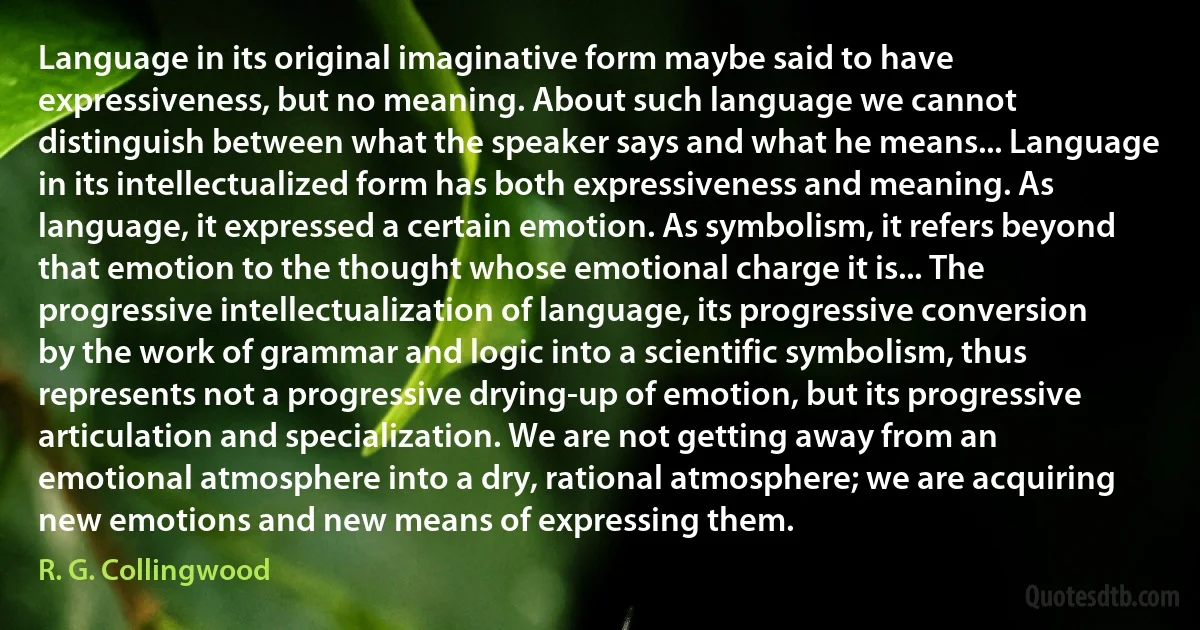
Language in its original imaginative form maybe said to have expressiveness, but no meaning. About such language we cannot distinguish between what the speaker says and what he means... Language in its intellectualized form has both expressiveness and meaning. As language, it expressed a certain emotion. As symbolism, it refers beyond that emotion to the thought whose emotional charge it is... The progressive intellectualization of language, its progressive conversion by the work of grammar and logic into a scientific symbolism, thus represents not a progressive drying-up of emotion, but its progressive articulation and specialization. We are not getting away from an emotional atmosphere into a dry, rational atmosphere; we are acquiring new emotions and new means of expressing them.
R. G. CollingwoodRelated topics
acquiring articulation atmosphere beyond certain charge conversion dry emotional form getting grammar language meaning progressive say specialization symbolism thought thus work means expressivenessRelated quotes
From education by the Church to education by Germanic value is a step of several generations. We are the transition from one education to the other. We are the conquerors of one era and the founders of a new - also religious - epoch. We bear a heavy and therefore a great destiny. To destroy images is something every revolution has been able to do. But to establish its cause upon nothing and yet not to burn all bridges behind it: that is the nobility of character of the National Socialist era. The German people is not marked by original sin, but by original nobility. The place of Christian love has been taken by the National Socialist, Germanic idea of comradeship...which has already been symbolically expressed through the replacement of the rosary by the spade of labour.

Alfred Rosenberg
Today, our country has ushered into an era of technological advancements, when current achievements oblige us to mobilize all our forces and work with a maximum effectiveness and goal-orientation. Therefore, our goal is a single one, namely: to rally around our values, to be proud of our achievements and to be confident with the future. This is the way in which Armenia can move ahead. Armenia should improve more than the previous day. All of us should constantly remember this. All of us should remember the logic of a better Armenia, a safer Armenia, a prosperous Armenia, and a powerful Armenia... Let there be an atmosphere of kindness and tolerance throughout all our undertakings. I am thankful...and onward to a new Armenia, onward to a prosperous Armenia.

Serzh Sargsyan
For what advantage is it, that the world enjoys profound peace, if thou art at war with thyself? This then is the peace we should keep. If we have it, nothing from without will be able to harm us. And to this end the public peace contributes no little: whence it is said, ‘That we may lead a quiet and peaceable life.' But if any one is disturbed when there is quiet, he is a miserable creature. Seest thou that He speaks of this peace which I call the third (inner, ed.) kind? Therefore when he has said, ‘that we may lead a quiet and peaceable life,' he does not stop there, but adds ‘in all godliness and honesty.' But we cannot live in godliness and honesty, unless that peace be established. For when curious reasonings disturb our faith, what peace is there? or when spirits of uncleanness, what peace is there?

John Chrysostom
Don't forget that God sees you and watches you when you are in pain; He perceives even the beating of your heart. Consequently, He will not leave you without consolation and His fatherly protection. Naturally, the saints rejoiced in their afflictions; as for us, let us at least manage to accept affliction or pain patiently.
My child, pray within your heart, and the name of Jesus will become for you a comforting balm so that you can bear this trial of yours in a way which benefits you. You will greatly benefit from this trial if you submit yourself to it patiently. So again I say to you, with the almighty armor of prayer continually approach the omnipotent Lord more often, and you will come to know how He wondrously lifts the burden of pain and marvellously gives rest to sufferers.

Ephraim of Arizona
WHAT HAPPENS AFTER DEATH?
When a human soul goes out of the body, some great mystery happens. For if it is guilty of sins, then there come hordes of demons, evil angels and dark forces, take that soul and drag it to their side.
No one should be surprised at that, because if a man surrendered and fell prey to them while still alive in this world, will not they have even greater control over him and enslave him when he departs from this world?
As for the other, the better part of people, something different happens to them. There are Angels around the holy servants of God in this life; the holy spirits surround them and protect them; and when their souls are separated from the body, the choir of Angels welcomes them into their fellowship, into a bright life, and thus leads them to the Lord.

Macarius of Egypt
